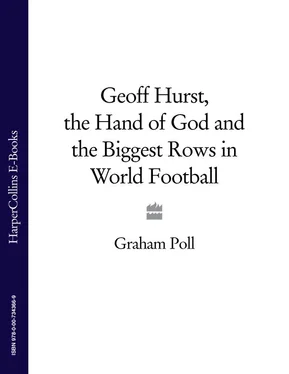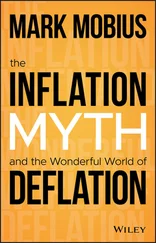Thirteen minutes later, Materazzi equalized, leaping two feet higher than his marker to head home an Andrea Pirlo corner, and it was still 1-1 after 90 minutes.
Fourteen minutes into extra-time, goalkeeper Buffon tipped a Zidane header over the bar, but the French captain’s next, and last, contribution to the beautiful game was a moment of ugly bad temper. Angered by something Materazzi said to him, Zidane head-butted the Italian defender in the chest. It was a belting butt. Materazzi went down like a felled tree. He was hurt, no doubt, but probably also stunned—and so was the watching world when TV showed the astonishing incident. But that didn’t happen straightaway. It was an off-the-ball clash and TV coverage was following the ball. So there was quite a lot of confusion until a replay of the incident made it apparent that Zidane deserved to be sent off.
There was confusion as well for the referee, Horacio Elizondo from Argentina. He had also been concentrating on the ball and hadn’t seen the head-butt. It is how he learned that Zidane deserved to be sent off that fascinates me. That is what is still discussed and debated in refereeing circles. But, for now, let’s just say that Elizondo did get the message and did show Zidane the red card. For me, watching at home, the sight of the best player I ever refereed walking back to the dressing room and passing the World Cup, where it stood on a plinth waiting for the presentation ceremony, was one of the saddest moments I can remember; sad for a player I admired so much and sad for football.
There were no more goals. So, for only the second time, the World Cup Final was decided by penalties. Materazzi took Italy’s second spot-kick, and scored. David Trezeguet, the man whose goal gave France victory over Italy in the Final of Euro 2000, was the only player not to score his penalty. His kick hit the crossbar, landed on the goal-line and bounced out. Again, no Azerbaijani assistant was needed. It was not a goal. Italy won the penalty contest 5-3, and with it their fourth World Cup.
I am intrigued by what happened after the clash between Zidane and Materazzi. But what happened immediately before it, and provoked it, has also been the subject of controversy ever since.
France were attacking. Both men were standing in the Italian penalty area with their backs to the goal. The Italian was immediately behind the Frenchman and, as happens more often than not in modern football, grabbed hold of him. He stretched his right arm around in front of Zidane and grabbed a handful of shirt at about—if you’ll pardon the expression—nipple height.
The attack broke down, the ball sailed forward over their heads, Materazzi let go of Zidane and both men strolled forward towards the halfway line. Words were exchanged. Both men agree about the beginning of the exchange. They concur that, when Materazzi had hold of Zidane, the Frenchman said, ‘If you want my shirt that badly, I shall give it to you after the match.’ What was said next has been disputed, and Materazzi won damages from a British newspaper which alleged, falsely, that he used a racist expression. So let’s accept Materazzi’s version, which appeared in his autobiography.
Materazzi wrote that he was upset by Zidane’s tone, which the Italian felt implied he was not worthy of receiving such an important shirt. ‘Because I was annoyed by his arrogance, I replied, “Preferisco la puttana di tua sorella” (I would rather have your whore of a sister).’
Nice. So Zidane turned, put his head down like a bull about to charge, and rammed Materazzi with it.
After the match, whenever the sending off was shown on television, you saw Zidane head-butt Materazzi and then referee Elizondo sprinting over and brandishing his red card. But that was an edited clip and not how it happened. One minute and thirty seconds passed between the violent conduct and the red card, and it is what happened during that minute and a half that intrigues me.
The referee did not see the incident. Neither did either of the assistants. That much was agreed afterwards and, anyway, if the ref had seen the head-butt, he would have stopped play at once and sent off Zidane much sooner. Similarly, if an assistant had seen it, he would have flagged straightaway, pressed the buzzer on his flag to alert the ref and have spoken into his lip microphone, saying something like, ‘Stop play! There’s been a head-butt.’ We know that didn’t happen.
Play went on briefly and only stopped when referee Elizondo awarded a free-kick to France near the halfway line for an entirely different, minor incident more than 30 metres away from the head-butt. At that point, Elizondo became aware of Materazzi flat out on the grass and ran over to him. The ref did not talk to Zidane at all, but called on the trainer to deal with the injury. Players milled around. Buffon, the Italian goalkeeper, came out of his area to join in and made a gesture to the nearest assistant referee, pointing at his own eye as if to say, ‘You must have seen that.’ Eventually Elizondo jogged over to that assistant and had a very, very brief conversation. Neither man said more than four or five words. After that, Elizondo sprinted back to Zidane and sent him off.
The next day FIFA released a statement. The crucial part said, ‘The incident was directly observed [i.e., without the use of a monitor] by Fourth Official Luis Medina Cantalejo from his position at the pitchside, who informed the referee and his assistants through the communications system.’
That authorized version of events was important to FIFA because they were, and are, stubbornly opposed to the use of video replays or similar technological help for referees. FIFA’s position is that it is a Pandora’s box which must never be opened. Their belief is that if you allow the use of technology to help decide whether the ball has crossed the goal-line for a goal, for instance, then the pressure would increase to use slow-motion replays to review penalty decisions, sendings off, offsides…and almost everything.
I have asked myself what I would have done. That is what referees usually think when something controversial happens in a football match. It’s part of the learning process, part of the self-appraisal that goes on all the time. Sometimes, as well, you have a special reason for putting yourself in the shoes of the ref. For instance, when I was sent home early from Euro 2000, I could not help calculating that, if I’d stayed and things had gone well, my last match would probably have been the semi-final between France and Portugal. So I watched with special interest when that match ended in incredible drama. There was a handball on the line in extra-time. It led to a sending off and a penalty—and the spot-kick won the match for France because the ‘golden goal’ rule applied at the time (the first goal scored in extra-time won the match). I sat and watched that all unfold and kept thinking, ‘Blimey! I might have had to give those critical decisions.’
And again on 9 July 2006, as I watched the World Cup Final on TV at my home in Tring, Hertfordshire, I had an additional reason for putting myself in the place of the ref—because, if I had not made my three yellow cards mistake, it might have been me refereeing the Final. So, yes, I thought what I would have done—what I should have done—if I had been the ref. And if I had been the referee, I hope I would have prevented the confrontation between Zidane and Materazzi.
As you run back following play, you are sometimes aware of men having a go at each other. You get a feel, a sense, of things like that from the body language, from the circumstances and from experience. Then, you ask yourself whether you can trust them not to let their squabble get out of hand. If the answer is, ‘No’, then you stop play, go over and say, ‘Lads, have you got a problem?’ You manage them and the situation, and it all blows over.
Читать дальше












